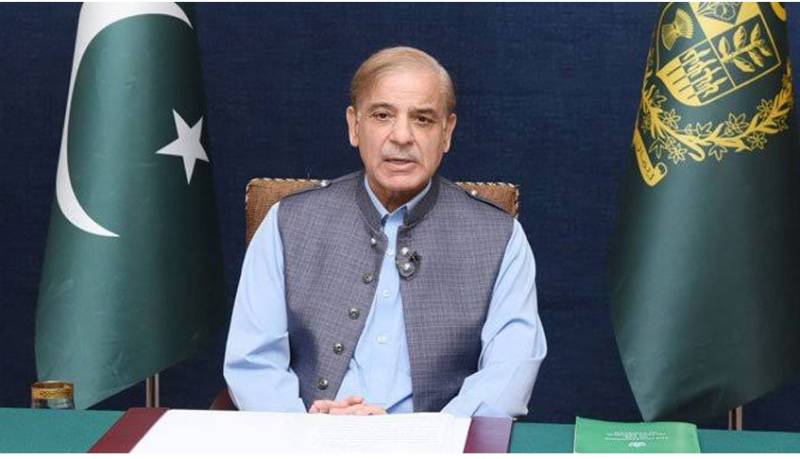Govt reduces power tariff for electric vehicle charging stations by 45%
PM Shehbaz terms reduction in EVs tariff a welcoming initiative: Awais Leghari says Power Division proposed revised agreements with 18 more IPPs

Stay tuned with 24 News HD Android App

Prime Minister Muhammad Shehbaz Sharif has said that 45 percent reduction in the tariff from Rs70 to Rs40 for electric vehicles’ charging stations is a good and welcoming initiative, reported 24NewsHD TV channel.
Speaking at a high-level meeting in Islamabad on Wednesday regarding promoting the culture of using electric vehicles in the country, the prime minister said it will also help save foreign exchange in terms of import of fuel for domestic consumption and lessen climate change impacts.
Shehbaz Sharif directed the Ministry of Power to continue work on promoting culture of using electric vehicles and launch a special campaign to create awareness among the masses in this connection.
He said the world is much concerned over hazardous effects of climate change. He said there is also need to address the commercial aspect of the electricity tariff for electric vehicles.
Later, addressing a news conference in Islamabad, Federal Minister for Energy Sardar Awais Ahmad Laghari said that power division has reduced 45 percent power tariff for electric vehicle charging stations and now charging stations will get Rs39.70 per unit from the current Rs71 per unit.
The minister said that regulations related to electric vehicle charging stations will also be implemented and registration and business will be allowed within 15 days.
Leghari said that under the leadership of Prime Minister Shehbaz Sharif, a special concessional electricity rate was announced today for electric vehicle charging stations.
The special concessional electricity rate for charging stations has been reduced from the current Rs71 per unit to Rs39.70 per unit. Thus, for the first time in the history of the country, the per unit electricity price for electric vehicles has been reduced by 44 percent.
Along with this, regulations related to the establishment of the first electric vehicle charging stations and battery replacement points in the history of the country have also been implemented. These regulations have been implemented under the National Energy Conservation Authority, an institution of the Power Division, for which a regular gazette notification has also been issued.
The circular debt decreased to 12 billion rupees, reaching 2,381 billion rupees for the period from July to November 2024 as the debt was 2,393 billion rupees on June 30, 2024.
The minister highlighted that the recovery rate for the period from July to November 2024 has reached 96%, significantly improving compared to the same period in 2023 due to the prudent policies of the government.
Meanwhile, the minister also revealed that the power division proposed revised agreements with 18 more Independent Power Producers (IPPs) before the federal cabinet.
The Cabinet Committee on Energy approved the Power Division’s summary, granting permission for a single-point power supply to Industrial States and Special Industrial Zones beside authorizing their management for giving connection, bill collection, and other related matters.
The decision was made to address complaints from industrial zones and special industrial zones regarding the new connections and billing process, said a press release.
In this regard, a mechanism is also being developed, which would be implemented by the Power Division in the next two to three months.
The minister stated that the power sector has begun to reap the benefits of the steps taken by the Power Division.
According to an estimate, there are currently 10 million motorcycles in the country and they spend $6 billion on fuel annually. Thanks to the conversion of these motorcycles to electric technology, which is possible on an average for fifty thousand, not only will they get their full money back in terms of capital savings in three to four months, but also billions of dollars will be saved in terms of valuable foreign exchange.
Similarly, the use of electric technology in three-wheeled vehicles (rickshaws) is also likely to significantly reduce the cost of travel within the city, which will not only make a significant difference in fares but will also help in preventing the cost of harmful gases, which will help in dealing with air pollution.
The reduction in travel costs will also have an impact on the delivery of goods within the city, which will also make a positive difference in the prices of necessities of life.
Due to this revolutionary initiative of the Power Division, while on the one hand there is a possibility of a positive change in travel costs and related matters, a positive business opportunity is also being provided due to the establishment of charging stations and battery replacement points in every street. With a concessional price, permission for the establishment of charging stations or battery points can now be obtained in just 15 days. In this regard, the Power Division’s subsidiary NEECA has established a one-window and now registration can be done only by visiting the website.
In this regard, to ensure a competitive market and facilitate domestic and foreign direct investment, these regulations have been simplified and the registration fee has also been kept at just 50 thousand. The implementation of these regulations is estimated to achieve the target of 30% electric vehicle inclusion by 2030.
The regulations related to electric vehicles and battery replacement points support the provision of charging technology at five different levels. These regulations provide equal opportunities to all global and regional electric vehicle manufacturers. Special attention has also been paid to the protection of charging stations and battery replacement points and related measures under these regulations, which will also be regularly monitored and audited.
The issuance of regulations related to preferential electricity rates and electric vehicle charging stations will provide new profitable business and investment opportunities, which will not only provide new job opportunities but will also strengthen the entire national economy.
Reporter Awais Leghari
